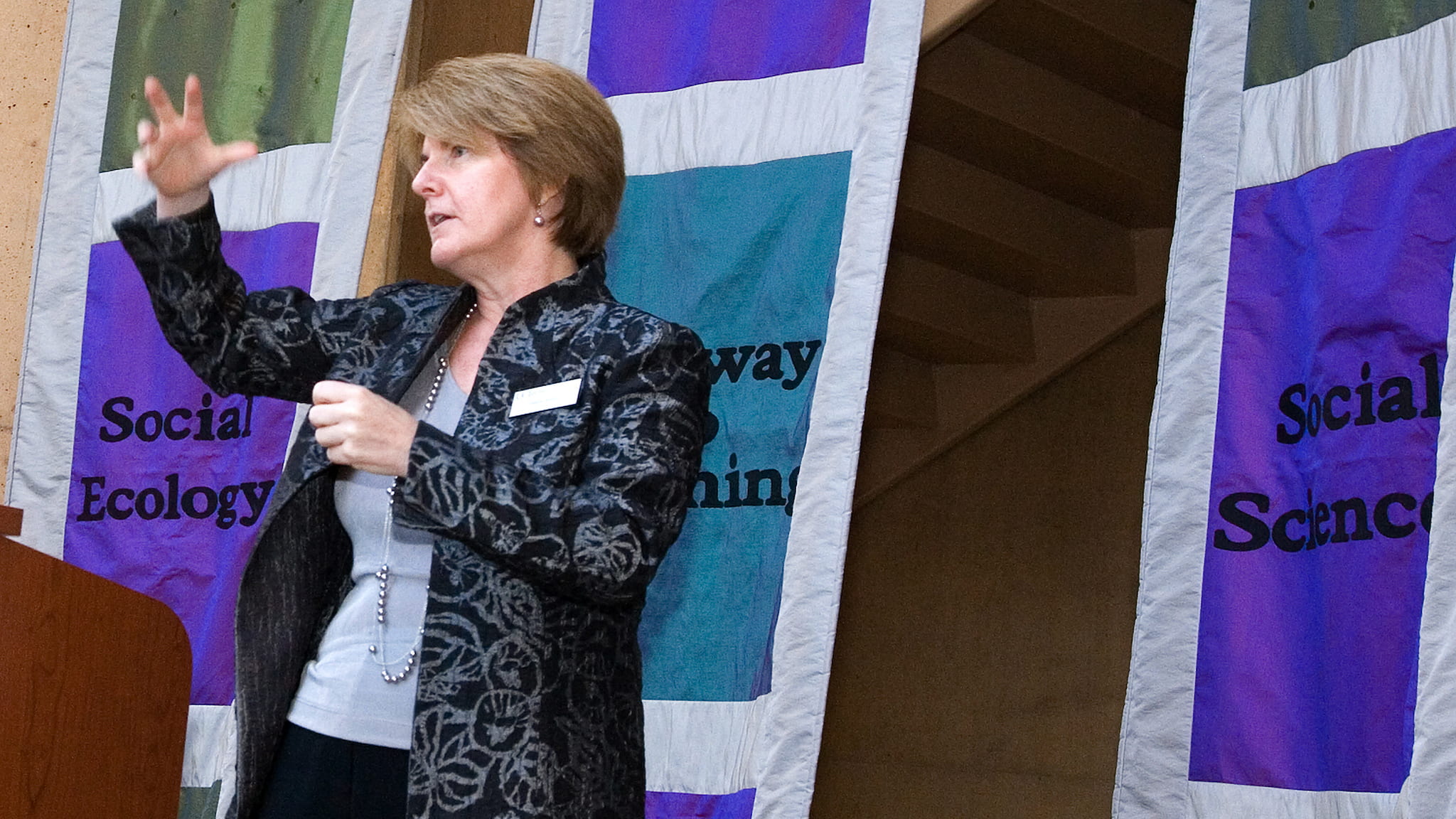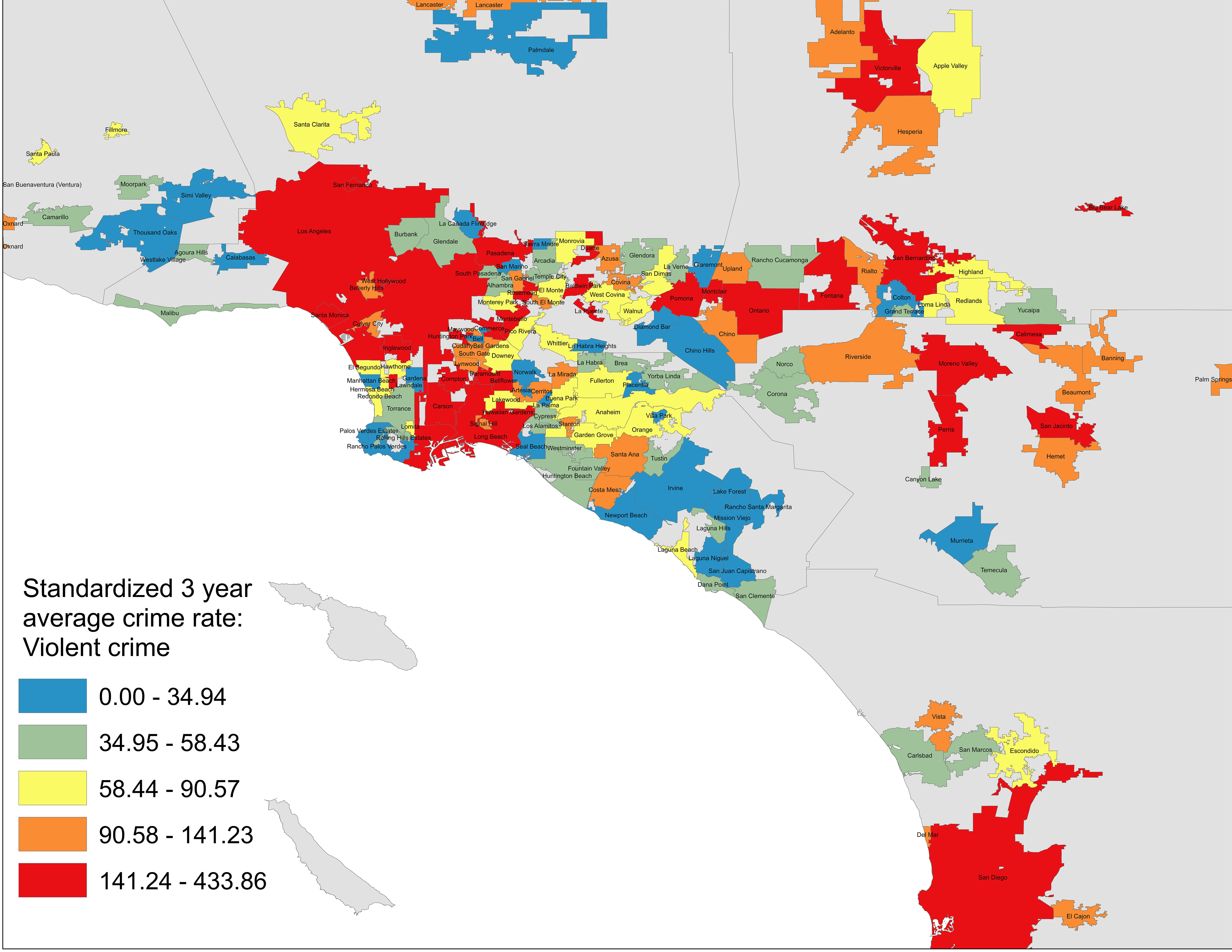Social ecology dean drawn to gritty side of life
As her studies of prison violence, hate crimes and prostitution show, Valerie Jenness is drawn to the gritty side of life.

The plight of the underdog has inspired countless books and movies. In Valerie Jenness’ case, it has guided her career.
Dean of UC Irvine’s School of Social Ecology since September and professor of criminology, law & society, Jenness has spent much of her academic life digging into unglamorous topics – prison violence, hate crimes and the rights of sex workers, to name a few.
“I’ve always been interested in the most vulnerable and marginalized people,” she says. “How the least advantaged among us fare in society and how our social institutions and laws help or harm them are questions that run through my research.”
Among the framed degrees and awards for research, teaching and public service in Jenness’ fifth-floor office is a photo of her with blue-jeaned inmates at the California Institution for Women, in Corona, where she recently gave a commencement address.
Jenness also recently gave a presentation for the UCI Foundation at the Pacific Club on the wide scope of work in the School of Social Ecology. She speaks with equal enthusiasm about the two events, emphasizing the personal and professional benefits of interacting with diverse audiences.
“Both groups are fascinating and a rich source of insight, but, of course, they’re in different social spaces and face different challenges: Prisoners want safety and freedom, while the trustees want to help UCI prosper,” she says. “The best thing about my professional life is that I get a window into our world from a range of points of view. I consider it a privilege to be able to engage with and learn from all sorts of people in all sorts of contexts. It’s probably why I chose to be a sociologist.”
Lori Sexton, a doctoral candidate in criminology, law & society, worked with Jenness on a study that involved traveling to 28 men’s prisons in California to interview 315 transgender inmates over nine weeks. Jenness’ professionalism and sense of humor helped alleviate the stress of such a demanding research project, she says.
“Val never comes across as fake or pretentious or less than genuinely interested in whomever she’s talking to,” Sexton says. “She’s wonderfully personable and gets along with everyone in any situation, whether she’s hobnobbing with officials at fundraising dinners or chatting with prisoners over granola bars.”
A Southern California native and product of the University of California system, Jenness earned a doctorate in sociology at UC Santa Barbara in 1991 and came to UCI in 1997 as assistant professor of criminology, law & society, with a courtesy appointment in sociology.
She subsequently served as graduate director and chair in her home department – before becoming dean of the entire school – while also pursuing social justice and sound policy off campus. Jenness testified before the California Senate Committee on Public Safety in 2008 and joined Gov. Schwarzenegger’s Rehabilitation Strike Team to help implement the Public Safety & Offender Rehabilitation Services Act of 2007.
Her research focuses on the links among crime, social change and public policy. Among her findings: California’s hate crime laws are unevenly interpreted and enforced across the state; transgender inmates are 13 times more likely to be sexually assaulted than the general prison population; and in the latter part of the 20th century prostitutes creatively mobilized to pursue the rights of those engaged in the world’s oldest profession. The American Sociological Association has praised her ability to balance the roles of “preeminent scholar in her field, policy adviser and public sociologist.”
“Val Jenness is a great administrator, in the best sense of the word,” says George Tita, associate professor of criminology, law & society and director of the recently announced master’s program in public policy. “She’s a strong and effective advocate for the School of Social Ecology, yet realistic in the face of budget challenges.”
Jenness prefers to discuss her aspirations for the school rather than personal accomplishments.
“If I had to sum up our larger goal, it would be twofold: First, I think we have an obligation to understand the communities – local, state, regional and global – in which we live,” she says. “I like the idea of students learning in the classroom as well as experientially and through civic engagement. Ideally, they don’t leave here without having participated in at least one community service project.
“Second, I think we have an obligation to contribute to the betterment of our communities through research, teaching and engagement.”
Celebrating its 40th anniversary, UCI’s School of Social Ecology is home to nine research centers and more than 60 faculty and 250 graduate students in the departments of criminology, law & society; psychology & social behavior; and planning, policy & design. Faculty conduct research on subjects as varied as global poverty and urban planning, prison overcrowding and public health, gang violence and injustice, and child development and aging.
“I don’t want us to hunker down and contract,” Jenness says. “I want us to grow, innovate and continue to move into the 21st century in a way that makes good on our proud history and our land-grant, public-service mission. And I think we can do so while changing with the times.”
Kitty Calavita, Chancellor’s Professor Emerita of criminology, law & society, is working with Jenness on a study of the inmate grievance process in California. She’s impressed by her ability to juggle a very active research agenda and deanship. “Val is an energetic and proactive leader,” she notes, “but strongly believes in shared governance as a principle.”
About Jenness’ comedic side, renowned among her colleagues, Calavita says: “Val has an amazing sense of humor and finds humor in all situations. If she didn’t have an incredibly successful career in academia, she could be a stand-up comic.”
But Anteaters needn’t worry about losing Jenness to comedy. She prefers a stage from which to educate students, faculty, staff and community members about the school and the university, as well as the larger world in which they exist and prosper.
“The real fun part of my job is that I get paid to learn and be challenged every day,” Jenness says. “I’m a true believer in what knowledge production and dissemination – coupled with old-fashioned passion, commitment and engagement – can contribute to our lives and communities.”


